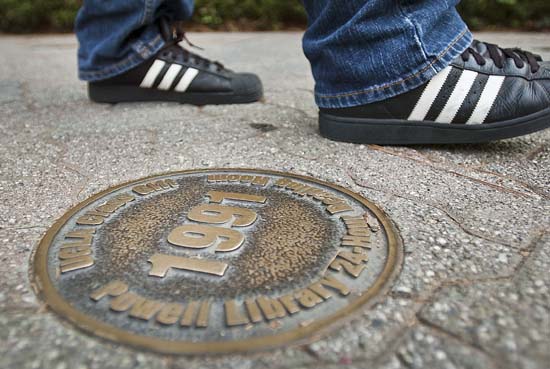Night Powell has served thousands of students as a late-night and early-morning study room since 1996.
The concept of an extended-hour reading room ““ known as Night Powell ““ came years earlier as a result of the 1991 senior class gift. That year, the senior class raised $86,549 to transform the room that formerly housed the university archives into the reading room now called “Night Powell,” said Dawn Setzer, the director of Library Communications at UCLA.
Night Powell was open as late as 2 a.m. during weekdays. In March 2000, the schedule was extended to 24 hours a day during tenth week and finals week, and because of an increase in funding from the chancellor in September 2001, Night Powell was open around the clock Sunday through Friday as early as fourth week of each quarter.
But now, with a $1.8 million, or five percent, decrease in state funding this past year, the school officials have drastically reduced the hours of Night Powell, closing it for the entire quarter with the exception of tenth and finals week.
Because of the closing of Powell Library for seismic renovation in the fall of 1992, the late-night study room was not open to the public until the fall of 1996. During the five-year interim period of the renovation, a temporary library was built on the grass area in Wilson Plaza at the bottom of Janss Steps. Students nicknamed the building “Towell,” short for temporary Powell.
With a total cost of $3.2 million, Towell was a two-story, 36,000-square-foot tent-like building with a red brick base, a steel frame and curved aluminum ribs covered by yellow and white polyester fabric. It held 200,000 books and journals, said Charlotte Brown, UCLA’s university archivist.
“When facing the entrance, it looked like a happy face, (although) I don’t know if this was intended,” said Esther Grassian, information literacy librarian. “When it rained, it sounded like the inside of a drum.”
Although the physical transformation of Night Powell was attributed to the 1991 senior class gift, the money could not be used to maintain the extended hours of Night Powell because of the official language of the gift.
“The fund language specified that it was to be used for purchasing furnishings, not for salaries for the staff necessary to keep the facility open or (Night Powell),” Setzer said.
The money that is allocated to staff, security and energy bills to maintain the 24-hour schedule is taken from the library’s regular operations budget.
“Many departments are feeling the financial pressure to be able to keep (Night Powell) open all night. The school is looking at resources and services and how to trim,” said Monica Kenney, UCLA’s assistant director of Student Giving at UCLA.
The Undergraduate Students Association Council has been trying to maintain correspondence with both library officials and the chancellor to keep the extended hours of Night Powell that students used in past years.
During an Oct. 1 breakfast meeting with USAC representatives, Chancellor Gene Block verbally consented to open up or find funding for Night Powell, said Jason Tengco, a USAC general representative who also serves as an undergraduate representative on the committee of library and scholarly communications.
Tengco met with Gary Strong, UCLA’s university librarian, on Oct. 9 to voice concerns pertaining to the continuance of the reduced hours of Night Powell.
“We wanted Gary Strong to hold the chancellor accountable to his promise,” Tengco said.
Currently, USAC’s plan of action concerning Night Powell depends on what the chancellor and library officials decide to do in the next couple of weeks.
Although it is pushing for the complete opening of Night Powell in its full capacity, USAC has been trying to come up with different money saving strategies for keeping portions of Night Powell open for at least a limited amount of hours outside tenth and finals week, said Layhannara Tep, academic affairs commissioner.
At the moment, the student welfare commission is trying to find alternative study spaces to open during midterms and finals.
“Not having a safe place to study is simply not acceptable,” Tep said.
